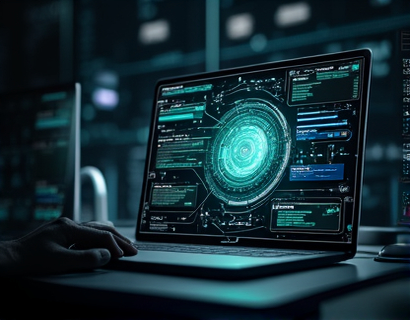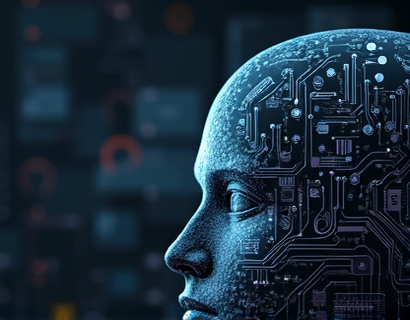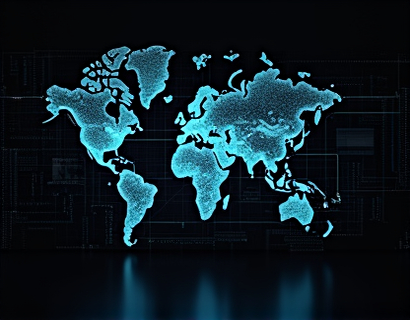Revolutionizing Productivity: The Synergy of AI and Crypto in the Future Workplace
The integration of Artificial Intelligence (AI) and cryptocurrency is ushering in a new era of productivity and efficiency in the workplace. This transformative blend of technologies is not just a buzzword but a tangible shift in how tasks are managed, how work is executed, and how value is created and exchanged. As we delve into this topic, it's essential to understand the foundational roles that AI and cryptocurrency play individually before exploring their combined potential.
Understanding AI in the Workplace
Artificial Intelligence, defined as the simulation of human intelligence processes by machines, particularly computer systems, has become an indispensable tool in modern business operations. AI encompasses a range of technologies including machine learning, natural language processing, and robotics. In the context of productivity, AI can automate repetitive tasks, provide data-driven insights, and enhance decision-making processes. For instance, AI-powered tools can analyze vast amounts of data to identify trends and predict outcomes, allowing businesses to make informed decisions swiftly and accurately.
One of the most significant impacts of AI is in the realm of task management. AI-driven applications can prioritize tasks based on urgency and importance, suggesting optimal workflows and reducing the cognitive load on employees. Virtual assistants, powered by AI, can handle scheduling, reminders, and even draft communications, freeing up valuable time for more strategic activities. Moreover, AI can facilitate collaboration by analyzing team dynamics and suggesting improvements, thereby enhancing overall productivity.
Exploring Cryptocurrency in Business Operations
Cryptocurrency, on the other hand, represents a decentralized digital currency that uses cryptography for security. Beyond its role as a medium of exchange, cryptocurrency is revolutionizing various aspects of business operations, particularly in the areas of finance and supply chain management. The transparency and immutability of blockchain, the underlying technology of cryptocurrency, ensure secure and transparent transactions, reducing the need for intermediaries and lowering transaction costs.
In the context of productivity, cryptocurrency can streamline payment processes, making them faster and more secure. Smart contracts, self-executing contracts with the terms directly written into code, can automate and enforce contractual obligations, reducing the risk of disputes and delays. This automation not only speeds up transactions but also minimizes errors, contributing to a more efficient workflow.
Synergistic Potential of AI and Crypto
The true power of AI and cryptocurrency lies in their synergistic potential when combined. This blend creates a robust ecosystem where the strengths of both technologies complement each other, leading to unprecedented levels of productivity and innovation. Let's explore some key areas where AI and cryptocurrency intersect and enhance each other.
Decentralized Autonomous Organizations (DAOs)
Decentralized Autonomous Organizations (DAOs) are a prime example of the fusion of AI and cryptocurrency. DAOs are community-driven organizations governed by smart contracts on a blockchain. These organizations can leverage AI to optimize decision-making processes, resource allocation, and even conflict resolution. AI algorithms can analyze data from various sources to provide insights that inform the DAO's strategic decisions, ensuring that the organization operates efficiently and transparently.
For instance, AI can monitor market trends and suggest optimal investment strategies for the DAO's funds, while also managing day-to-day operations by automating routine tasks. This combination ensures that the DAO remains agile and responsive to changing conditions, maximizing its productivity and impact.
Enhanced Security and Trust
Security and trust are paramount in any business environment, and the combination of AI and cryptocurrency addresses these concerns effectively. AI can enhance security measures by detecting and mitigating threats in real-time, analyzing patterns to identify potential vulnerabilities. Cryptocurrency's inherent security features, such as encryption and decentralization, further fortify the system against cyber threats.
Moreover, the transparency provided by blockchain ensures that all transactions and decisions are recorded and verifiable, building trust among stakeholders. This trust is crucial for fostering collaboration and ensuring that all parties are aligned in their goals and expectations. AI can further enhance this trust by providing auditable and transparent reports, making it easier to track and verify activities within the organization.
Optimized Workflows and Automation
The integration of AI and cryptocurrency can significantly optimize workflows and automation processes. AI can analyze data from various sources to identify inefficiencies and suggest improvements, while cryptocurrency can facilitate seamless and secure transactions to implement these improvements. For example, AI can optimize supply chain management by predicting demand, managing inventory, and automating payments to suppliers using cryptocurrency.
Smart contracts can automate payment processes based on predefined conditions, ensuring that payments are made promptly and securely. This not only speeds up the supply chain but also reduces the risk of fraud and errors. AI can also monitor the performance of these processes, providing continuous feedback and adjustments to maintain optimal efficiency.
Data-Driven Insights and Personalization
AI's ability to process and analyze large datasets provides invaluable insights that can drive business decisions. When combined with cryptocurrency, these insights can be monetized and shared in a secure and transparent manner. For instance, AI can analyze user behavior and preferences to offer personalized services and products, which can be facilitated through cryptocurrency-based microtransactions.
This personalized approach not only enhances user experience but also creates new revenue streams. AI can identify patterns and trends that indicate potential demand for certain services, and cryptocurrency can enable quick and secure transactions to capitalize on these opportunities. This synergy ensures that businesses can adapt rapidly to market changes and customer needs, maintaining a competitive edge.
Challenges and Considerations
While the combination of AI and cryptocurrency offers numerous benefits, it is essential to acknowledge the challenges and considerations involved. One of the primary concerns is the regulatory landscape. Both AI and cryptocurrency are still evolving fields, and regulations vary significantly across different regions. Businesses must navigate these regulations carefully to ensure compliance and avoid legal issues.
Another challenge is the technical complexity involved in integrating these technologies. Developing and maintaining AI and blockchain systems requires specialized skills and resources. Organizations must invest in training and hiring experts who can effectively implement and manage these technologies. Additionally, ensuring the interoperability of AI and cryptocurrency systems is crucial for seamless integration and optimal performance.
Ethical Considerations
Ethical considerations are also paramount when combining AI and cryptocurrency. AI systems can inadvertently perpetuate biases if not designed and monitored properly, leading to unfair outcomes. Similarly, the use of cryptocurrency must be approached with a focus on sustainability and environmental impact, as some blockchain networks consume significant energy resources.
To address these concerns, organizations should adopt ethical AI practices, such as regular audits and bias mitigation techniques. For cryptocurrency, adopting energy-efficient blockchain solutions and supporting sustainable initiatives can help minimize the environmental footprint. Transparency and accountability are key to building trust and ensuring that the benefits of these technologies are realized without compromising ethical standards.
Future Outlook
Looking ahead, the integration of AI and cryptocurrency is poised to transform the workplace in profound ways. As these technologies continue to mature, we can expect even more innovative applications and deeper integrations. The future may see AI-driven platforms that seamlessly incorporate cryptocurrency for transactions, governance, and incentive mechanisms within organizations.
For instance, AI could manage a company's cryptocurrency portfolio, optimizing investments and managing risks in real-time. This would not only enhance financial decision-making but also provide a new dimension of autonomy and efficiency. Additionally, the rise of Web3 and decentralized applications (dApps) will further blur the lines between traditional and digital workspaces, creating more fluid and collaborative environments.
In conclusion, the synergy between AI and cryptocurrency is not just a technological trend but a fundamental shift in how we approach productivity and efficiency in the workplace. By leveraging the strengths of both technologies, organizations can unlock new levels of performance, security, and innovation, paving the way for a more dynamic and resilient future.











































